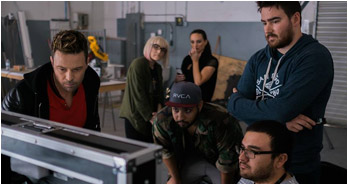
Copyright © Reyner Media and made available under the Attribution 2.0 Generic License
Accounting in the film and television industry is extremely important for budgeting out your financial resources appropriately and making sure that you come out ahead and are profitable.
Scope of Work
The first step in developing a responsible financial plan of action is to go over the script and storyline thoroughly and take into account all of the various resources needed to make each scene happen.
For example, if your movie or show has an action scene of a car chase on a freeway, you have to consider if it will be CGI or non-CGI, do you need stunt actors, will you need to shut down a section of the freeway, do you need to rent a drone to record the chase, etc.
Other more standard things to consider are how big your crew will be, who you need, how many cast members, how many extras (and will they be paid), what types of locations and do you need to remodel any properties, how do you plan on marketing your film after it is completed, and much more.
As you go through the script, taking notes on everything you need will help you develop your scope of work – how much everything will cost and how much time the entire project will take.
Once you get a good scope of work, if you have the money already, you can get started right away. Otherwise, this is where you can take your budget and use it to approach potential investors and raise funds for your production. If you are unable to raise all the funds you need, then you can re-evaluate your needs and compromise on various aspects of your project.
Bookkeeping
It’s always great to be as organized as possible as you spend money. It helps keep you on track to prevent splurging on unnecessary items too early in the process.
Also, there will be times when certain parts of the film will have unanticipated costs and can severely damage your ability to spend money for the rest of production if you didn’t account for some extra padding in your original budget or have a less expensive backup plan to make up the price-difference in other scenes.
This is where experience really comes into play as far as finding other cost-effective resources and creative low-budget alternatives.
Taxes & Reporting
After the film or show has wrapped up production and is “out there” for the public, there still needs to be ongoing financial record-keeping and tax reporting as the production generates income. Investors will need to know the financial status of the film to ensure that they receive a return on their investment, as will other individuals or companies who are in “profit-sharing agreements.”
Hollywood Accounting
There is a term called “Hollywood accounting,” which is essentially “creative accounting.” Because there can be so many elements to making a film, video or TV show, it is easy to inflate costs in order to reduce a production’s profit number. The reason why there is a draw to showing a lower profit is to cut the amount of money that would need to be paid out in royalty fees or other profit-sharing agreements since those are based on the net profit.
There have been many lawsuits filed against corporations who manipulated their numbers in order to show that they never made a profit even though they actually did. For more information about these lawsuits, check out Wikipedia and their resources.
It should go without saying, but on both sides, the accountant and the production corporation, it is important to conduct yourself with the utmost integrity in order to gain and keep trust in the industry because not paying those who invested their time, money and expertise into making your project a huge success will damage your reputation for future work.
Click here to view our other blog post on how to create your own production budget.
Featured Business
Advertisement
Disclaimer: The information contained in this article is deemed to be accurate and true to the best of our knowledge. All data and information provided on this site is for informational/entertainment purposes only. If there are any inaccuracies, you may submit corrections and sources by visiting our Contact page. Nevada Film Office makes no representations as to accuracy, completeness, currentness, suitability, or validity of any information on this site & will not be liable for any errors, omissions, or delays in this information or any losses, injuries, or damages arising from its display or use. All information is provided on an as-is basis. We do not sponsor or endorse anyone in our posts nor do we receive compensation of any kind in exchange for providing information about specific websites or resources unless otherwise noted, so please check for references, business licenses or credentials as you feel necessary.





Connect With Us
Proud Members of: